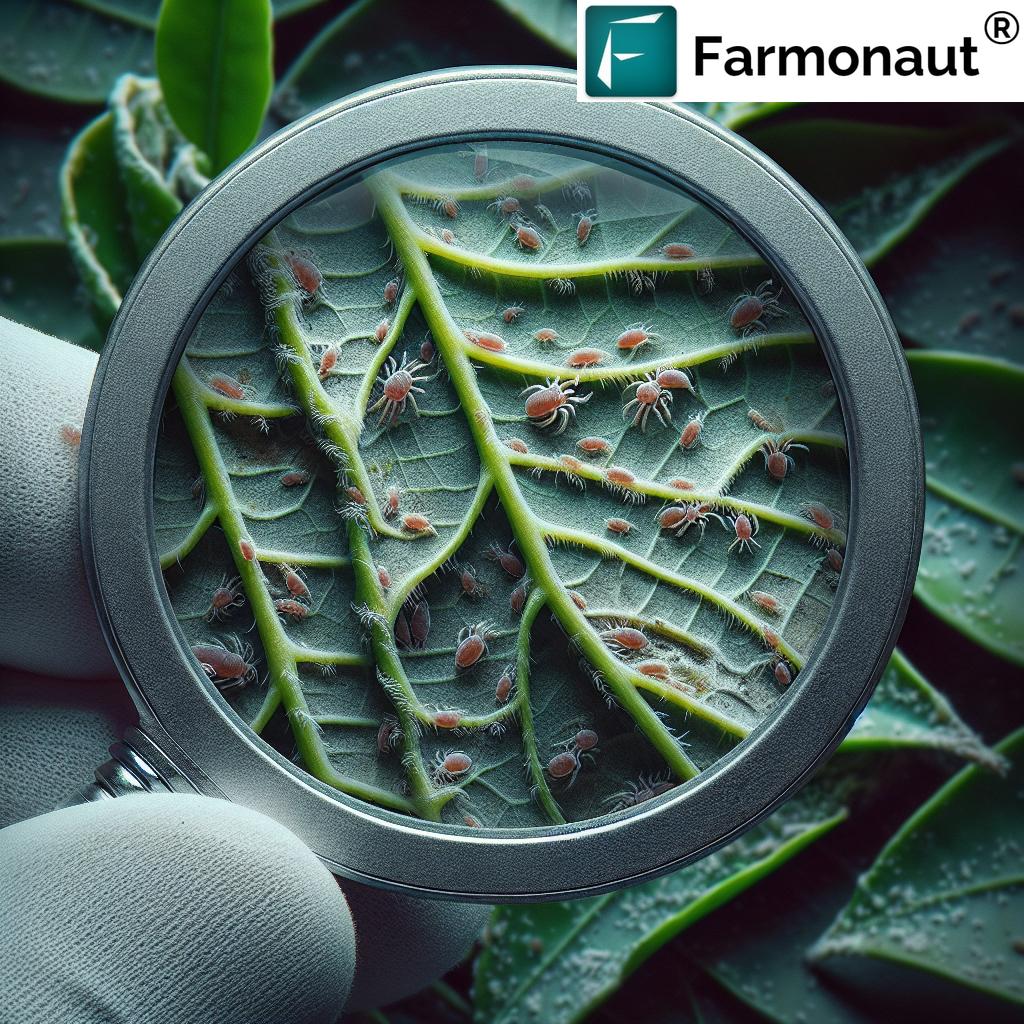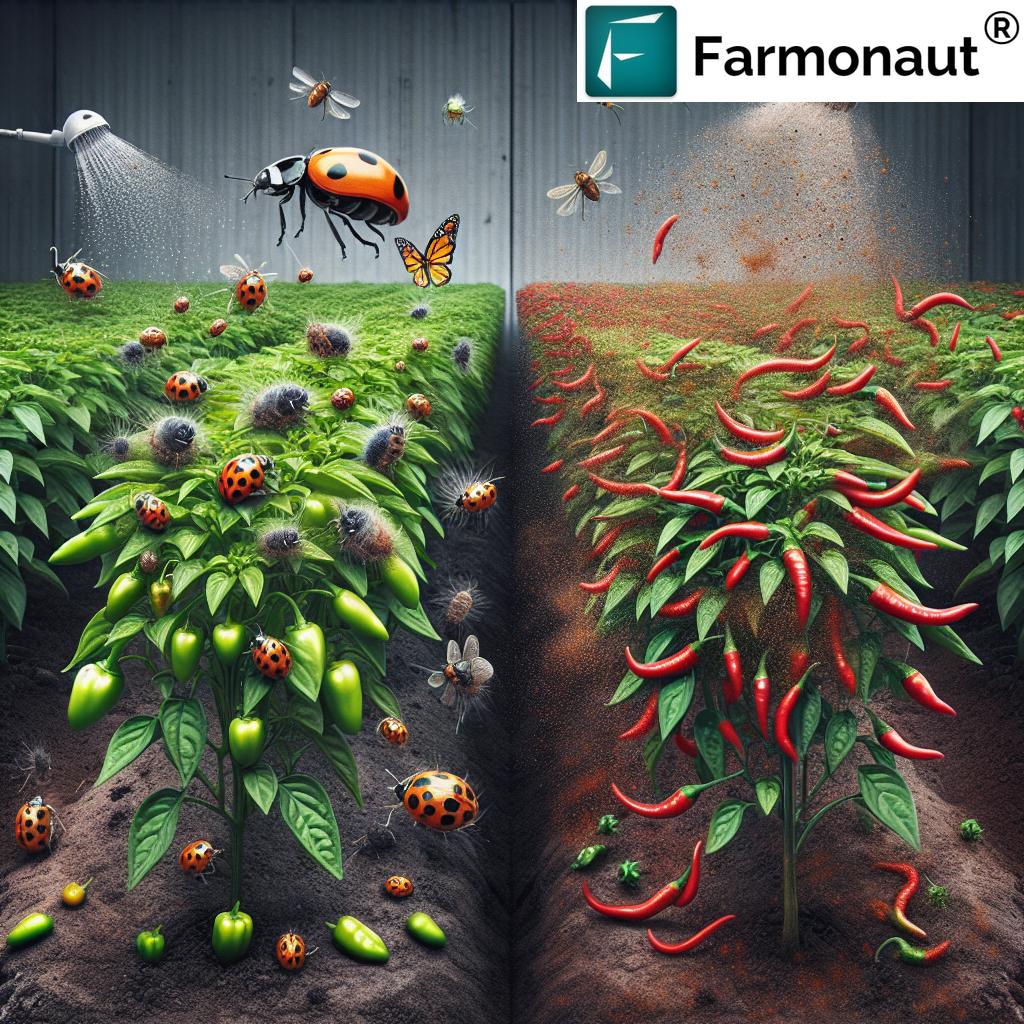
Organic Pest Control: Battling Mites on Citrus, Chilli, and Eggplants – A Scientific Approach to Crop Protection
In the ever-evolving world of agriculture, we at Farmonaut understand the critical importance of effective pest management. Among the myriad of challenges faced by farmers, mites stand out as particularly troublesome pests that can wreak havoc on various crops. In this comprehensive guide, we’ll delve deep into the world of mites, focusing on their impact on citrus, chilli, and eggplants, and explore both organic and conventional methods of control.
Understanding Mites: The Tiny Terrors of Agriculture
Mites are minuscule insects that belong to the arachnid family. Despite their small size, these creatures can cause significant damage to crops through their feeding habits. Let’s explore some of the most common types of mites that affect agricultural crops:
- Citrus Red Mite (Panonychus citri)
- Two-Spotted Spider Mite (Tetranychus urticae)
- Broad Mite (Polyphagotarsonemus latus)
- European Red Mite (Panonychus ulmi)
- Rust Mite (Phyllocoptruta oleivora)
These mites are known for their ability to rapidly reproduce and spread across crops, making early detection and control crucial for preventing significant yield losses.
The Impact of Mites on Key Crops
1. Citrus Crops
Citrus trees are particularly vulnerable to mite infestations. The citrus red mite and rust mite are common culprits that target these fruit-bearing trees. Symptoms of mite damage on citrus include:
- Silvering or bronzing of leaves
- Leaf drop
- Reduced fruit size and quality
- Stunted growth
2. Chilli Plants
Chilli plants are often targeted by broad mites and spider mites. The damage caused by these pests can be severe, leading to:
- Leaf curling and distortion
- Stunted growth
- Flower and fruit drop
- Reduced yield and quality of chilli peppers
3. Eggplants
Eggplants are another favorite host for various mite species, particularly the two-spotted spider mite. Mite infestations on eggplants can result in:
- Stippling on leaves (small yellow or white spots)
- Leaf bronzing and eventual leaf drop
- Reduced fruit size and quality
- Overall plant weakening
Detecting Mite Infestations: The Importance of Early Identification
Early detection of mite infestations is crucial for effective control. However, due to their microscopic size, mites can be challenging to spot with the naked eye. Here’s a comparison of various mite detection methods:
| Method | Accuracy | Coverage area | Time efficiency | Early detection capability | Cost-effectiveness |
|---|---|---|---|---|---|
| Traditional visual inspection | Low | Limited | Low | Low | Moderate |
| Magnifying glass examination | Moderate | Limited | Low | Moderate | Moderate |
| Leaf sample analysis | High | Limited | Moderate | Moderate | Low |
| Farmonaut Satellite System | High | Extensive | High | High | High |
As evident from the table, the Farmonaut Satellite System offers significant advantages in terms of large-scale monitoring, early detection capabilities, and cost-effectiveness. By utilizing advanced satellite imagery and AI-powered analysis, we can detect subtle changes in crop health that may indicate mite infestations before they become visible to the naked eye.
Organic Control Methods for Mite Management
At Farmonaut, we advocate for sustainable and environmentally friendly farming practices. Organic pest control methods offer an effective alternative to conventional chemical treatments. Here are some organic approaches to managing mite populations:
1. Biological Control
Introducing natural predators of mites can help keep their populations in check. Some effective biological control agents include:
- Predatory mites (e.g., Phytoseiulus persimilis)
- Ladybugs
- Lacewings
- Predatory thrips
2. Cultural Practices
Implementing good cultural practices can significantly reduce the likelihood of mite infestations:
- Proper irrigation to avoid water stress
- Regular pruning to improve air circulation
- Removal of infested plant material
- Crop rotation
- Maintaining biodiversity in the farm ecosystem
3. Organic Sprays and Treatments
Several organic substances can be used to control mite populations:
- Neem oil
- Horticultural oils
- Insecticidal soaps
- Sulfur-based treatments
- Diatomaceous earth
4. Plant-Based Repellents
Certain plants have natural repellent properties that can deter mites:
- Marigolds
- Chrysanthemums
- Garlic
- Chives
Conventional Chemical Control Methods
While we prioritize organic approaches, there are situations where conventional chemical control methods may be necessary, especially in cases of severe infestations. Some commonly used insecticides for mite control include:
- Abamectin
- Bifenazate
- Spiromesifen
- Etoxazole
It’s crucial to note that the use of chemical insecticides should be approached with caution, as they can have negative impacts on beneficial insects and the environment. Always follow label instructions and local regulations when using any pesticide.
Integrated Pest Management (IPM) for Mite Control
At Farmonaut, we recommend an Integrated Pest Management (IPM) approach that combines various control methods for optimal results. IPM involves:
- Regular monitoring and early detection
- Implementing preventive measures
- Using biological control agents
- Applying organic treatments when necessary
- Resorting to chemical control only as a last resort
Our satellite-based crop monitoring system plays a crucial role in the IPM strategy by providing early detection of potential mite infestations, allowing farmers to take timely action.
The Role of Technology in Mite Management
Advanced technology is revolutionizing the way we approach pest management in agriculture. At Farmonaut, we leverage cutting-edge satellite imagery and AI-powered analytics to provide farmers with valuable insights into crop health and potential pest issues.
Farmonaut’s Satellite-Based Crop Monitoring
Our satellite-based system offers several advantages in mite detection and management:
- Early detection of stress patterns indicative of mite infestations
- Large-scale monitoring capabilities, covering vast agricultural areas
- Regular updates on crop health status
- Integration with other farm management tools for comprehensive pest control strategies
By utilizing our advanced technology, farmers can detect and address mite issues before they escalate, potentially saving crops and reducing the need for extensive chemical treatments.
Case Studies: Successful Mite Management in Various Crops
1. Citrus Orchards
In a large citrus orchard in California, the implementation of an IPM strategy supported by Farmonaut’s satellite monitoring system led to a 60% reduction in mite-related crop losses over two growing seasons. The early detection capabilities allowed for timely application of organic control methods, minimizing the need for chemical interventions.
2. Chilli Farms
A group of chilli farmers in India utilized our satellite monitoring system to detect early signs of broad mite infestations. By implementing targeted organic control measures based on our data, they achieved a 40% increase in yield compared to previous years when relying solely on conventional pest management techniques.
3. Eggplant Production
An eggplant farm in Spain integrated Farmonaut’s technology into their pest management strategy, focusing on early detection of two-spotted spider mites. The combination of our satellite monitoring and a biological control program using predatory mites resulted in a 50% reduction in pesticide use while maintaining high crop quality.
The Future of Mite Control in Agriculture
As we look to the future, the management of mites and other agricultural pests will likely become even more sophisticated. Some emerging trends and technologies include:
- Precision agriculture techniques for targeted pest control
- Development of mite-resistant crop varieties through advanced breeding techniques
- Use of drones for localized pest monitoring and treatment application
- Integration of IoT devices for real-time pest monitoring
- Advanced predictive models for pest outbreak forecasting
At Farmonaut, we’re committed to staying at the forefront of these technological advancements, continually improving our satellite-based monitoring system to provide farmers with the most effective tools for pest management.
Conclusion: A Holistic Approach to Mite Control
Effective management of mites in citrus, chilli, eggplants, and other crops requires a comprehensive, science-based approach. By combining organic control methods, judicious use of conventional treatments when necessary, and leveraging advanced technologies like Farmonaut’s satellite monitoring system, farmers can significantly reduce the impact of mite infestations on their crops.
Remember, the key to successful mite control lies in early detection, consistent monitoring, and the implementation of an integrated pest management strategy. By adopting these practices and utilizing the latest technological tools, we can work together towards more sustainable and productive agricultural practices.
FAQs
Q1: How can I tell if my crops are infested with mites?
A1: Look for symptoms such as stippling on leaves (small yellow or white spots), bronzing, leaf curling, and overall plant weakness. For more accurate detection, consider using Farmonaut’s satellite monitoring system for early identification of potential infestations.
Q2: Are organic control methods as effective as chemical pesticides for mite control?
A2: Organic methods can be highly effective, especially when implemented as part of an integrated pest management strategy. While they may take longer to show results compared to chemical pesticides, organic methods are generally safer for the environment and beneficial insects.
Q3: How often should I monitor my crops for mite infestations?
A3: Regular monitoring is crucial. With traditional methods, weekly inspections are recommended. However, using Farmonaut’s satellite monitoring system allows for continuous, real-time monitoring of crop health, enabling early detection of potential mite issues.
Q4: Can mites develop resistance to chemical pesticides?
A4: Yes, mites can develop resistance to pesticides over time, especially if the same chemical is used repeatedly. This is one reason why an integrated pest management approach, which includes rotation of control methods, is recommended.
Q5: How does Farmonaut’s satellite monitoring system detect mite infestations?
A5: Our system uses advanced multispectral imagery and AI-powered analysis to detect subtle changes in crop health that may indicate mite infestations. This includes changes in leaf color, plant vigor, and other stress indicators that are often invisible to the naked eye.
For more information on how Farmonaut can help you manage mite infestations and improve your crop health, visit our app or explore our API services. You can also download our mobile app for Android or iOS devices. For developers interested in integrating our satellite and weather data into their systems, check out our API documentation.
